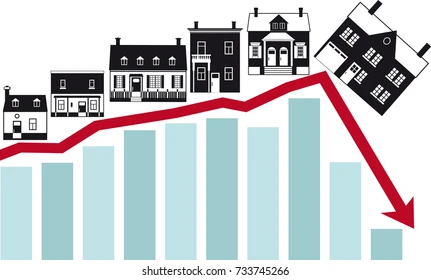The housing market is a complex ecosystem that can be influenced by a myriad of factors, from economic conditions to government policies. A housing market crash can have devastating effects on homeowners, investors, and the economy as a whole. In this article, we will explore the intricacies of the housing market crash, its causes, effects, and what the future may hold.
What is a Housing Market Crash?
A housing market crash occurs when there is a significant decline in home prices, often accompanied by a sharp increase in foreclosures and a decrease in home sales. This phenomenon can be triggered by various factors, including economic downturns, rising interest rates, and oversupply of homes. Understanding what constitutes a housing market crash is crucial for homeowners and investors alike.
The term “crash” implies a sudden and severe drop in home values, which can leave many homeowners underwater—owing more on their mortgages than their homes are worth. This situation can lead to a wave of foreclosures, as homeowners struggle to keep up with their mortgage payments. The psychological impact of a crash can also be profound, leading to a loss of confidence in the housing market and a reluctance to buy or sell homes.
Historically, housing market crashes have been associated with broader economic recessions. For instance, the 2008 financial crisis was precipitated by a housing bubble that burst, leading to a nationwide decline in home values. Understanding the dynamics of a housing market crash is essential for anyone looking to navigate the real estate landscape effectively.
Historical Context of Housing Market Crashes
To fully grasp the current state of the housing market, it’s essential to look back at historical crashes. The most notable example is the Great Recession of 2008, which was fueled by subprime mortgage lending and a housing bubble. During this period, home prices soared to unsustainable levels, driven by easy credit and speculative buying. When the bubble burst, it led to a catastrophic decline in home values, leaving millions of homeowners in financial distress.
Before 2008, the early 1990s also saw a significant housing market crash, particularly in regions like California and the Northeast. This crash was driven by a combination of overbuilding, rising interest rates, and a recession that led to job losses. The aftermath of these crashes often includes stricter lending practices and a more cautious approach to home buying.
Understanding these historical contexts helps to identify patterns and potential warning signs for future crashes. While each crash has its unique causes, the underlying themes of overvaluation, economic instability, and lending practices often recur.
Causes of a Housing Market Crash
Several factors can contribute to a housing market crash, and understanding these can help homeowners and investors make informed decisions. One of the primary causes is economic downturns, which can lead to job losses and decreased consumer confidence. When people are uncertain about their financial future, they are less likely to make significant investments, such as purchasing a home.
Another critical factor is rising interest rates. When the Federal Reserve increases rates, borrowing becomes more expensive, which can dampen demand for homes. Higher mortgage rates can lead to fewer buyers in the market, causing home prices to stagnate or decline. Additionally, if rates rise too quickly, it can trigger a wave of foreclosures as homeowners struggle to keep up with their payments.
Oversupply of homes is another significant contributor to housing market crashes. When builders construct more homes than there is demand for, it can lead to a surplus of properties on the market. This oversupply can drive prices down, as sellers are forced to compete for buyers. Understanding these causes is crucial for anyone looking to navigate the housing market effectively.
The Role of Speculation in Housing Market Crashes
Speculation plays a significant role in the housing market, often leading to unsustainable price increases. When investors buy homes with the expectation that prices will continue to rise, it can create a bubble. This speculative buying can drive prices to levels that are not supported by fundamental economic indicators, such as income growth and job stability.
During the lead-up to the 2008 crash, many investors purchased homes with the intention of flipping them for a quick profit. This behavior contributed to the rapid increase in home prices, which eventually became unsustainable. When the market corrected itself, it led to a sharp decline in home values and a wave of foreclosures.
Understanding the role of speculation is essential for both buyers and sellers. While it can lead to short-term gains, it can also create significant risks if the market turns. Being aware of market trends and avoiding overly speculative behavior can help mitigate the risks associated with a housing market crash.
Effects of a Housing Market Crash
The effects of a housing market crash can be far-reaching and devastating. For homeowners, a crash can mean losing significant equity in their homes, leading to financial distress and, in some cases, foreclosure. This loss of equity can have a ripple effect, impacting consumer spending and overall economic growth.
For investors, a housing market crash can lead to substantial losses. Properties that were once seen as valuable assets can quickly become liabilities, leading to a reevaluation of investment strategies. The psychological impact of a crash can also lead to a loss of confidence in the real estate market, making it difficult for investors to make informed decisions.
On a broader scale, a housing market crash can have significant implications for the economy. The construction industry, which relies heavily on a healthy housing market, can suffer job losses and decreased activity. Additionally, a decline in home values can lead to reduced property tax revenues for local governments, impacting public services and infrastructure.
Preparing for a Potential Housing Market Crash
While predicting the timing of a housing market crash is challenging, there are steps that homeowners and investors can take to prepare. One of the most important strategies is to maintain a healthy financial position. This includes having a solid emergency fund, avoiding excessive debt, and ensuring that mortgage payments are manageable.
Staying informed about market trends and economic indicators can also help individuals make informed decisions. Monitoring interest rates, employment data, and housing supply can provide valuable insights into the health of the housing market. Additionally, being aware of local market conditions can help homeowners and investors identify potential risks and opportunities.
Diversifying investments is another effective strategy for mitigating risks associated with a housing market crash. By spreading investments across different asset classes, individuals can reduce their exposure to any single market. This approach can provide a buffer during economic downturns and help preserve wealth.
The Future of the Housing Market
As we look to the future, the question remains: will the housing market crash again? While no one can predict the future with certainty, there are several indicators to consider. Current economic conditions, including employment rates and inflation, will play a significant role in shaping the housing market.
Additionally, government policies and regulations can impact the housing market’s stability. For instance, changes in lending practices or tax incentives for homebuyers can influence demand and supply dynamics. Staying informed about these developments can help individuals navigate the housing market more effectively.
Ultimately, the housing market is cyclical, and while crashes can be painful, they can also present opportunities for savvy investors. Understanding the factors that contribute to a housing market crash and being prepared can help individuals weather the storm and emerge stronger on the other side.
Conclusion
The housing market crash is a complex phenomenon influenced by various factors, including economic conditions, speculation, and government policies. Understanding the causes and effects of a crash is essential for homeowners and investors alike. By staying informed and prepared, individuals can navigate the housing market more effectively and mitigate the risks associated with potential downturns. As we move forward, keeping an eye on market trends and economic indicators will be crucial in determining the future of the housing market.




